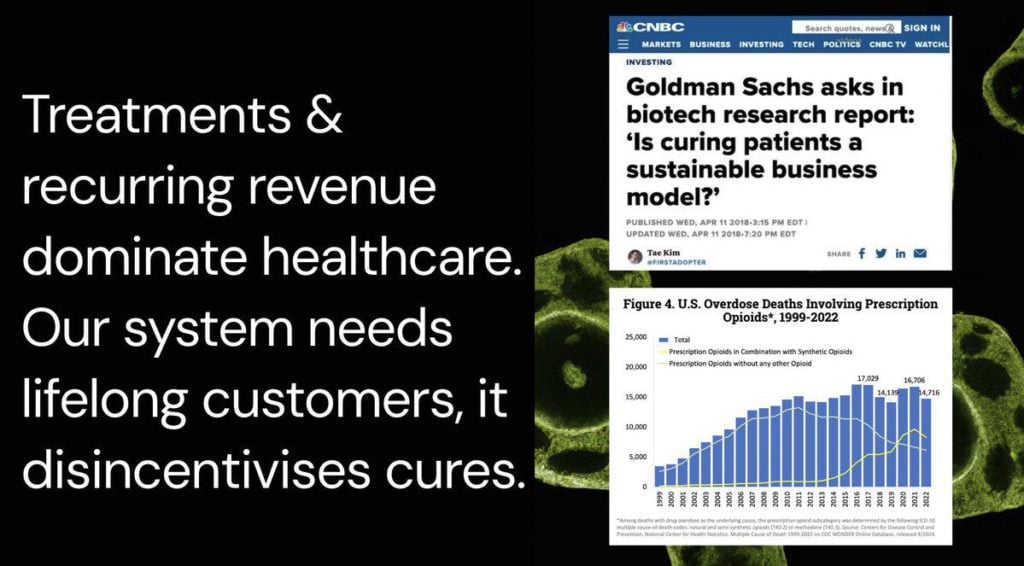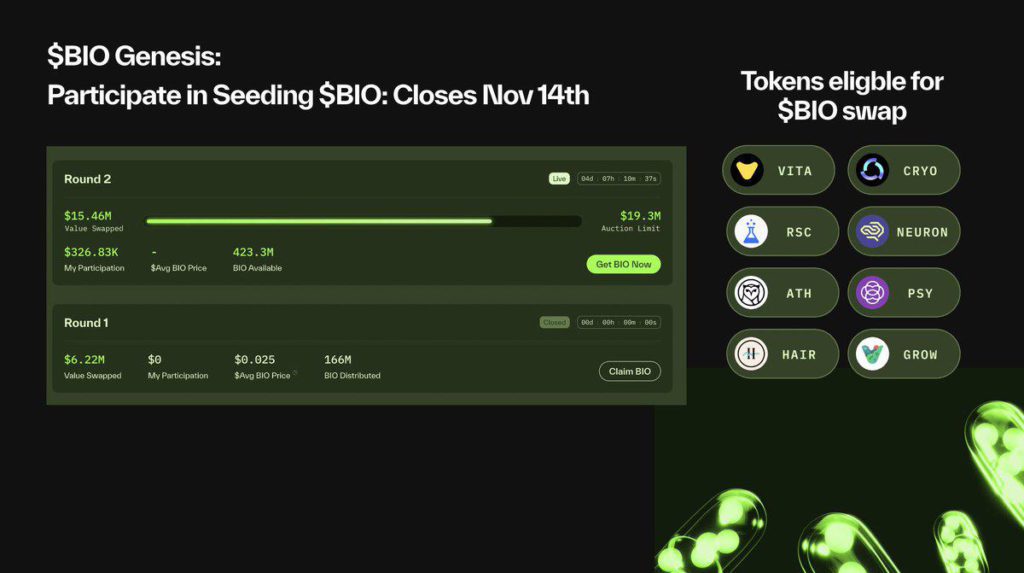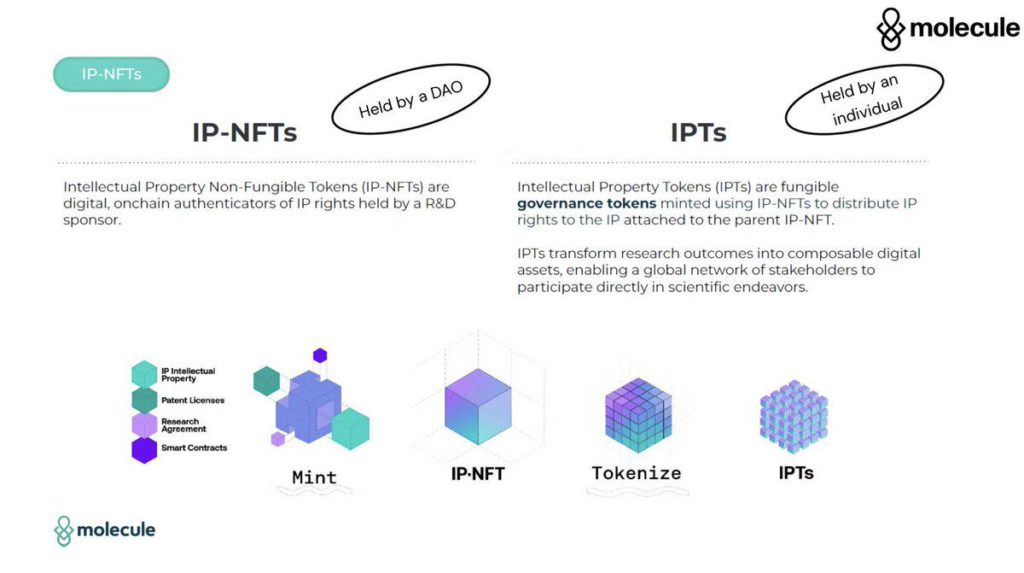Bitcoin, as the first decentralized digital currency system, has realized the value exchange without permission; Ethereum, through the introduction of smart contracts, allows anyone to deploy their own programs, realizing the execution of code without permission.
Many people invest in cryptocurrencies to maintain their autonomy and prevent the slowly and quietly eroded freedoms. Similar movements are forming in the fields of science and medicine, as the freedom of innovation, self-experimentation and dissemination of science has been eroded by the broken biomedical research and development system.
The current system is not conducive to disease cure
In 2018, Goldman Sachs released a report titled "The Genome Revolution", questioning whether curing patients is a sustainable business model. Goldman Sachs used Gilead Sciences as an example, as the company developed highly effective hepatitis C treatments and generated $12.5 billion in revenue in 2015, but as more patients were cured, sales plummeted to $4 billion in the following years.

While the use of opioid drugs for chronic pain management can ensure recurring revenue, it often leads to patient dependence on drugs rather than solving the problem. Their addictive nature has also led to widespread drug abuse and dependence. The deaths associated with opioids, especially those caused by prescription opioids, have become a major public health problem in the United States.
Scientists focus on fundraising rather than research
Imagine if software developers spent most of their time fundraising instead of writing code, what would that be like?
Most scientific talents are not fully utilized
Due to the lack of upgrading the basic foundations of science and technology, we are unable to realize the Solarpunk - an idealized vision of a highly harmonious society between humans and nature, full of sustainability, abundant resources and innovation.
These dilemmas have led to various obstacles and problems in the process of scientific development, rather than the "scientific fantasy" world we aspire to. So
what if we could build a decentralized and self-organizing scientific world? A self-sovereign scientific system driven by open data and liquid markets, with disease cure as its core goal.
Molecule DAO and BIO Protocol
Molecule is a protocol that brings scientific intellectual property (IP) onto the chain; BIO is an engine that provides startup and acceleration for on-chain scientific communities (BioDAOs), composed of scientists, patients and investors. BioDAO focuses on a specific scientific field or disease, developing on-chain intellectual property such as research, drugs, and products.
For example: VitaDAO has funded multiple projects on longevity science and research, including the VITA-FAST project, developed by the Vikorolchuk lab at the University of Newcastle.
The BIO Protocol team has built the first batch of BioDAOs across multiple scientific fields. According to Dune data, when Paul Kohlhaas gave a speech last week, the total market value of BioDAOs was less than $100 million, but as of November 18th, it has exceeded $230 million.
BIO aims to assist scientists, patients and biotech founders in the process of building on-chain scientific communities, such as token economics design, community building, funding and liquidity support. BIO token holders can vote to include DAOs into the network, similar to a community-owned accelerator, allowing the best teams to stand out and launch their communities on-chain.
The upcoming projects on the BIO Launchpad include:
- Curetopia: Targeting the $1 trillion rare disease market, its team includes a Y Combinator alumnus, a Harvard PhD, and a rare disease entrepreneur Eric Perlstein, who has advanced a drug to Phase III clinical trials with just $5 million, which usually requires over $100 million.
- Long COVID Labs: Accelerating cures for the over 100 million global Long COVID patients, led by former Stanford neuroscientist Rohan Dixit.
- Quantum Biology DAO: Building quantum microscopes to observe quantum biological phenomena, led by MIT PhD Clarice D. Aiello, who is also a world-leading quantum biologist.

To drive the development of this protocol, BIO recently held a Genesis event, inviting users to deposit supported DeSci tokens in exchange for BIO tokens. The Genesis event raised $33 million for the BIO treasury, and with the rise in DeSci token prices, the treasury funds have now exceeded $53 million. In addition, BIO has also received investment from Binance Labs.
The Role of IP-NFT
The BIO Protocol plays a core role in the BioDAO network, with each BioDAO developing drugs and therapies related to specific diseases or treatments, and these research results exist in the form of tokenized intellectual property (IP). Typically, each stage of drug development has been kept confidential from the public, but BioDAO aims to use blockchain technology to make this process more open and transparent.

IP-NFT is the foundation that supports this new model, allowing anyone to put intellectual property on the blockchain, making it programmable, tradable, liquid, and rich in data. In essence, IP-NFT is a container for intellectual property. Once the IP is fully validated, it can be divided into IPT (IP tokens) and used as governance tokens, allowing individuals to participate as active stakeholders in the scientific process.
For example, Vita-RNA, supported by VitaDAO, focuses on developing new mRNA-based gene therapies, led by biotech experts Michael Torres and Anthony Schwartz. The Vita-RNA project received $300,000 in initial funding, but the market value of its VITARNA token has grown to over $27 million. When a key drug candidate from Vita-RNA showed in vitro (laboratory) activity, its price began to rise on Uniswap.
The Future of BIO
The BIO Protocol is inspired by the bio/acc movement, which aims to accelerate the development of biology and disrupt many traditional perceptions of healthcare. Biotechnology is the new substrate of life itself. We must fundamentally reshape outdated scientific institutions and processes, accelerate all bio-related research, and build a globalized, participatory scientific network.







